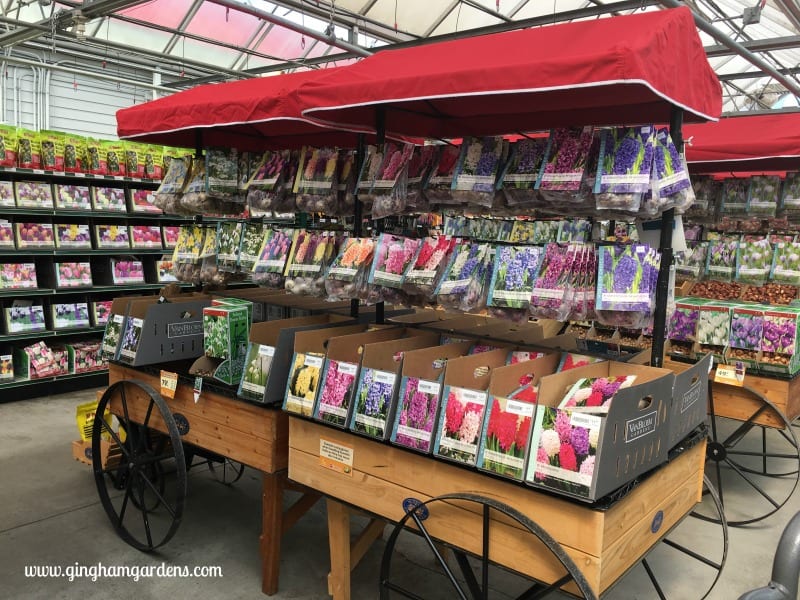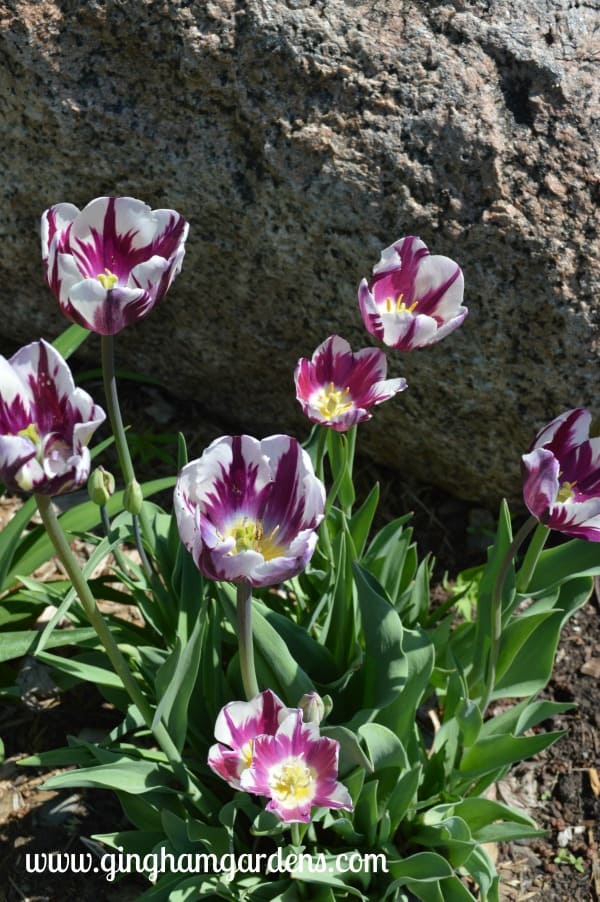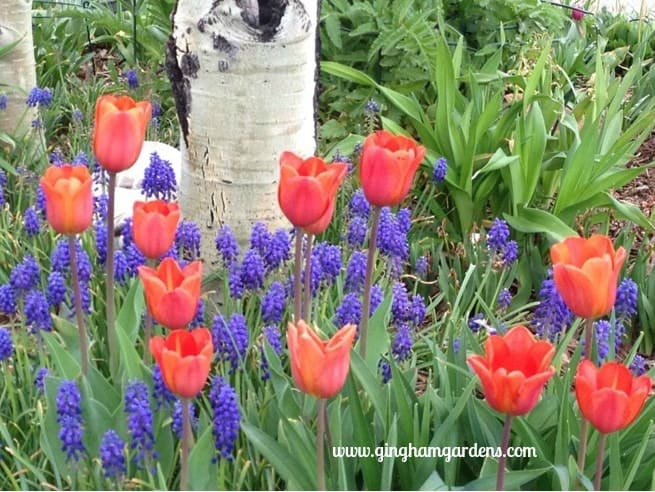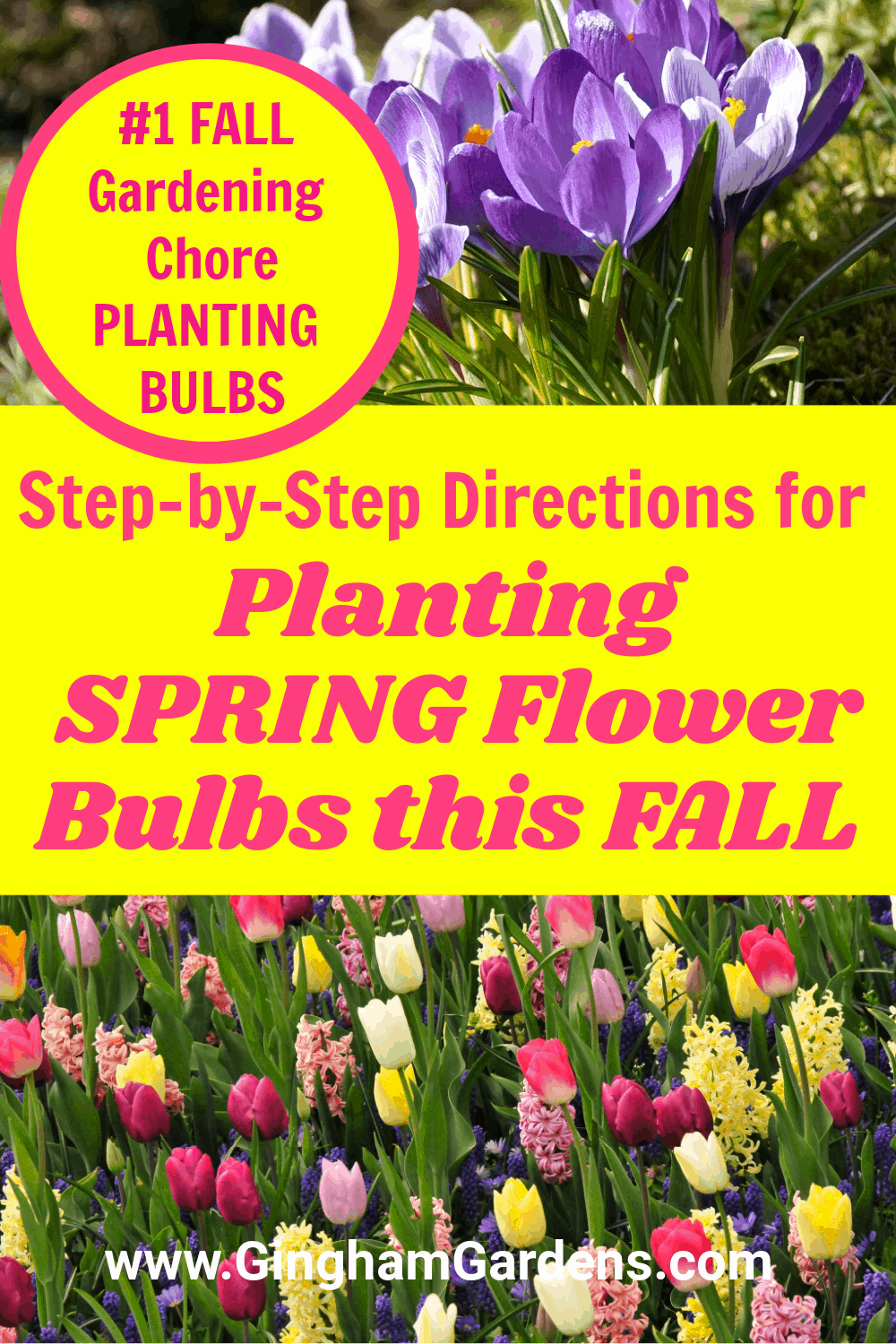Do you love the classic flowers that we associate with Spring, such as daffodils, tulips, crocus and hyacinths, AND WANT TO HAVE YOUR OWN? FALL is the time to get your hands dirty!
If you’re like me, when you see the catalogs or websites of nurseries that specialize in bulbs, you probably experience overload; they have too many pictures to count of swoon-worthy flowers! It’s so hard to narrow down what you’d like to try, but it will be worth taking the plunge. Go for it! After long, dreary winter months, there’s nothing better than to see those bits of green popping up through the soil, and then the flower buds, and then the resulting bright and cheery spring flowers.
You don’t even need a large flower bed for bulb planting. Bulbs can totally be planted in small spaces.
If you’re a beginner gardener, or if this is your first year planting bulbs, you’re in the right place. Or if you’ve planted bulbs before, but run into a few problems, this is the article for you too!
When I start seeing these displays in our local garden centers in late summer, I tend to go a little overboard. Can you relate?

This post contains affiliate links. If you click on
one of the links and make a purchase,
I may receive a small commission at no additional cost to you.
See full disclosure here.
Spring Flowers Grown From Fall-Planted Bulbs
There are so many varieties of spring flowering bulbs and they come in so many colors, shapes and sizes! To achieve the best spring color, try planting several varieties. Also, different bulbs have different bloom times, from early spring right through late spring. Here’s a list of the most popular types of bulbs:
Purchasing Flower Bulbs Online for Fall Planting
There are several very reliable online retailers from which you can purchase bulbs. These include John Scheepers, Dutch Gardens, the Southern Bulb Company and Eden Brothers. You can buy from local nurseries, as well. Costco sells bulbs too, and the last few years their bulbs have been the Longfield Gardens brand.
Flower bulbs for fall planting can also be purchased from Amazon. When purchasing online, be sure to read reviews and information about hardiness zones.
If your mail order bulbs arrive and they are soft, mushy or have mold on them. Return them immediately and do not plant them.

When to Plant Spring-Flowering Bulbs
It’s important to determine the right time for planting. The best time to plant bulbs in northern gardens, in zone 4, for example, is when temps are below 60 degrees Fahrenheit (15 degrees celsius). So the middle of October may be a good time to plant. Typically you’re aiming to plant 6-8 weeks before the ground freezes.
Further south, In zone 7, for instance, this temperature will be later. And even further south, in zones 8-9, you can plant much later: November or December. In these more southern climates, choose your bulbs carefully. Some varieties require more chilling than warmer areas generally get: since bulbs need a cold period of dormancy, bulbs may need to be refrigerated for a period of time before planting.
Don’t rush to get your bulbs in the ground just because it feels like it OUGHT to be Fall! If the temperatures surprise you by cooling down a bit, and you’ve planted too early, a warming trend may cause your bulbs to sprout! So, especially in the south, it’s best to wait. If your bulbs do sprout in the Fall, they may not come up in the Spring. However, if you have ordered from a reputable company, they may replace the bulbs.
How to Plant Fall Bulbs
First, rake back any mulch from the area where you want to plant your bulbs.
Next, you will need to dig a hole. It’s always a good idea to follow the package instructions, but as a general rule of thumb, bulbs need to be planted 2-3 times their size (the height of the bulb). For instance, if you have a tulip bulb that is about 3 inches, you will want to plant it at least 6 inches deep.
Plus, you will want to dig wide enough to hold anywhere from 8 – 12 bulbs. Remember, bulbs look better planted in drifts or en masse than in rows.
If the soil isn’t the greatest, add in some organic matter like compost to ensure good drainage; well-drained soil is important because if you don’t have it, bulbs can rot. Also, if you live in an area where snow is piled on the garden beds in winter, you can lose bulbs in those areas due to soggy soil.
Adding a small scoop of bulb fertilizer, can also makes a huge difference in the overall quality and quantity of the flowers the bulb produces.
Next, dump in the bulbs. Space them out a bit leaving a little room in between and make sure the bulbs are placed pointed end up. Think about how you want the flower beds to look in the Spring and plan your colors and heights accordingly! You may like to alternate different bulb varieties, if you have different colors and types of flowers.
Lastly, fill the hole back up, pack it down and spread a thick layer of mulch over it.
Pro Tip: Notice in the image below the bulbs are planted right up against other perennial plants. When those plants emerge in the spring they will eventually cover the dying foliage of the tulips.

How to Layer Bulbs for Design Purposes when Planting
Do you like the look of different bulbs blooming together? To achieve these look, simply layer the bulbs when you plant.
Plant your largest bulbs first.
Add soil and then plant the smaller bulbs to the depth they require.
Tips for Planting Fall Bulbs
Plant bulbs close to other perennials (like daylilies or hostas) that come up later, so their foliage will cover the dying foliage of the bulb after they are done flowering.
Planting bulbs in mounds or groups is so much more aesthetically pleasing than planting them in rows. We’re talking flowers here, not soldiers. I never plant bulbs 3 inches apart or whatever the instructions say, but it is necessary to leave room so the bulbs have room to multiply.
Although most spring flowers need full sun, a planting area that is normally in partial shade will also work to, because deciduous trees haven’t fully leafed out in spring.
When it comes to tulips and daffodils, the size of the bulb matters – larger bulbs mean larger flowers. So purchase high-quality bulbs, if your budget allows. You won’t regret it!
Tulip bulbs often come in early season, mid-season and late season bloomers. If you do choose to plant tulips, purchase bulbs in each of these categories so you can extend the bloom time of tulips.
How to Plant a Large Amount of Bulbs Quickly
Sometimes life gets in the way of our best intentions. So what do you do when you get a little carried away and purchase a ton of bulbs, or you’re simply running out of good weather?
- There is a video in this article that shows using a drill attachment. However if you really want to get the job done quickly, just grab a shovel!
- So take a shovel, dig a hole, dump the bulbs in the hole, turn the bulbs pointy side up and cover them.
- Of course, you need to follow the other best practices for planting bulbs in this article, but if you need to get it done quickly, this is the best way to accomplish the task.
Using a Bulb Auger vs. Using a Shovel to Plant Bulbs
There are so many bulb planter gadgets! You might give them a try, or you can go with this perfect shovel for planting bulbs! If you’re curious and happen upon a great sale on this gadget, you might decide to buy one. See this video where the bulb auger is compared to a shovel. Lack of familiarity with a bulb auger may prevent you from finding out how really useful it can be. It works especially well in compacted, dry, sandy soil, but not as well in moist soil. It’s useful to think of the bulb auger more like a miniature rototiller to loosen up the soil, instead of making individual holes.
To not have your arm ripped off, you do have to keep a good hold on the power drill with both hands, especially in hard, compacted soil.
Overall, I prefer a shovel over the bulb auger.
Here’s a Pin to help remind you of this post later. Save it to one of your gardening boards on Pinterest. There are more pins at the bottom of the post. Thanks for pinning!

How to Keep Squirrels and other Critters From Eating Your Bulbs
There’s nothing more frustrating that to go to the work and trouble of planting bulbs, just to have a squirrel dig them up. If you have a problem with critters digging up or eating your planted bulbs, here are a few things you can try:
- Be sure to plant bulbs deep enough! If you have a 2 – 3 inch tulip bulb, plant it at least 6 inches deep, or up to 9 inches deep. Squirrels are too lazy to dig that deep.
- I’ve read good things on gardening forums about Bonide Repels All Granules especially to keep squirrels from digging up bulbs.
- Sprinkle red pepper flakes or cinnamon on top of bulbs before you push the soil back over them and then on top of the soil and mulch, and that will repel various critters. This works especially well for small bulbs like crocus that aren’t planted deep.
- Spread chicken wire over the area where you’ve planted bulbs and then cover it with mulch. Before the bulbs start sprouting in the spring, the chicken wire can be removed, or it can be left and the bulbs will grow up through it.
- I’ve also seen gardeners fashion a cage made out of chicken wire and bury the bulbs in it.
- Try planting daffodils in the same hole as tulips because critters don’t like daffodil bulbs. They also will not mess with fritillaria bulbs or allium bulbs. They’re both pretty stinky.
- Always be sure to cover any freshly planted areas with mulch. If squirrels see an area that looks freshly dug, they will be all over it.
Why Didn’t My Tulips Flower?
I see this question so much. Tulips have been hybridized over the years with traits to satisfy the floral industry and not home gardeners. When you purchase tulip bulbs they will likely only last a season or two.
Pro Tip: There are two things you want to look for when buying tulip bulbs; if you want tulip flowers that return, either purchase species tulips or perennial tulips. Look for the words “species”, “perennial” or “naturalizing” in the description of the tulip bulb.
Below is an image of species tulips in one of my gardens. They aren’t at all what you think of when you think of tulips, but they are sweet, little blooms.

As an alternative, grow any variety of tulips that you want, but just expect that they will only be good for one season. You can always plant fancy tulip bulbs every fall.
Unless you’re just crazy over tulips, I would recommend going with daffodils. Daffodils are just so much more reliable and you don’t have to worry about critters eating them. Grape Hyacinths are also very reliable and easy to grow.
How to Keep Deer and Rabbits From Eating Tulips
It can be so incredibly frustrating to see beautiful buds forming on your new tulips, just to see them eaten off by deer or rabbits.
I highly recommend spraying your tulips and other perennial plants, as well, with Liquid Fence. You will need to reapply it on a regular basis just to keep an edge over wildlife.

The Results of Planting Bulbs in the Fall – Amazing Spring Flowers
The after, or the results of a few minutes (or a few hours in my case) of taking the time to plant bulbs in the fall is this beautiful, welcome sight the following spring. Although not instant gratification, next year you’ll be so happy you took the time to plant bulbs in the fall.
These were some of my all time favorite tulips. And, you guessed it, they only lasted one season.

More glorious tulips. Look at the inside of these – God’s amazing paintbrush!

Tete-a-tete are a miniature version of daffodils. They work perfectly for borders in spring gardens.

The combination of these bright yellow daffodils and the grape hyacinths are striking. If you’re curious about using color combinations in your flower gardens, check out this post when you’ve finished up here.

This mix of tulips and grape hyacinths from a Spring garden in Colorado is another gorgeous color combination.

Anemones are one of my new spring favorites. Not sure why, but I’ve never grown them until recently and I’m in love. They often bloom longer than most other spring bulbs, into late spring. You might want to add these to your garden this season.

Hyacinths smell amazing! Plant some by your front door, so you, your family and visitors to your home, will get a nice whiff of their fragrance when coming and going from your home.

What to Do When Spring Bulbs Finish Blooming
Unfortunately spring bulbs do not last forever and when they finish their bloom cycle, there’s ugly foliage left to deal with. It’s not a good idea to cut the foliage off, because it helps the bulb rejuvenate for the following season.
My best tip for hiding the dying foliage is to tuck the bulbs in around other perennials so that the other plants’ foliage cover the spring bulb foliage. Once the foliage turns brown, it practically falls off. For more tips and instructions on what to do with the foliage of bulb plants after they have finished blooming this You Tube video from the University of Illinois is very helpful.
Here are some other Fall Gardening posts you might enjoy:
Quick & Easy Steps for Fall Garden Cleanup
All About Seed Collecting
Tips for Keeping Potted Mums Looking Great
How to Overwinter Tender Plants & Bulbs
How to Keep Geraniums Over Winter
Fall is the best time to plan next year’s Gardens!
Garden Planning – How to Plan Next Year’s Garden
These instructions are pretty simple, right? Anyone can have a beautiful spring garden and you don’t need a green thumb. So buy some bulbs this fall and plant away!
Those of you who have never planted bulbs in the fall, I would encourage you to give it a try this year. Start with something easy like daffodils and don’t go overboard.
Thanks so much for stopping by Gingham Gardens! I hope you enjoyed these tips for planting bulbs. What bulbs are you going to plant this fall? Leave a comment and let me know. Or, if you have questions about planting bulbs, just leave a comment and I’ll get back to you.
Happy gardening,
Julie
More Great Things on Gingham Gardens
Sign up to receive our weekly newsletters full of gardening tips. You’ll also get access to our Gardening Resources Library and all our helpful gardening printables.
More places to find Gingham Gardens:
Save a pin to your gardening board on Pinterest, so you can remember this post later:


